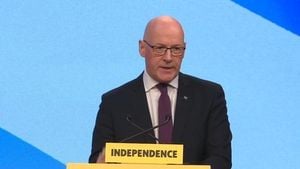A shocking video circulating on social media falsely claims that Dr. Matteo Bassetti, a well-known Italian infectious disease specialist, was fatally shot in his car. The video, which mimics a news report from Tg1, was created using artificial intelligence and features a simulated journalist and a deepfake version of Bassetti himself.
The fabricated report begins with a solemn announcement: "This morning, the famous Dr. Matteo Bassetti was mortally wounded by gunfire in his car at a busy intersection." It continues to assert that the day before this supposed incident, on May 4, 2025, Bassetti had revealed shocking information about the healthcare system, which allegedly cost him his life.
In a response posted on his social media accounts, Bassetti vehemently denied the claims, stating, "I don’t know what to say anymore. They keep falsifying my voice, threatening me, and saying I am dead. Now they even accuse me of having been killed. It’s incredible that the postal police and the judiciary can’t stop all this." His frustration is palpable, as he grapples with the fallout from this malicious misinformation.
The deepfake video not only features a fake journalist, purportedly resembling Tg1's Valentina Bisti, but also includes a scene where a simulated Bassetti makes absurd claims, such as, "If you keep going to the pharmacy, prepare for the funeral. The pharmaceutical industry is a mafia. It is not in their interest for you to be well. They profit from your pain." This statement, attributed to the fake Bassetti, highlights the alarming trend of using AI to create realistic but entirely false narratives.
Dr. Bassetti, who gained prominence during the COVID-19 pandemic for his public health advocacy, has been targeted by misinformation campaigns before. This incident marks a disturbing escalation in the use of technology to spread fake news. Bassetti noted that this is not the first time he has faced threats or disinformation, recalling a previous incident on Valentine's Day of 2022 when he received intimidating messages via WhatsApp.
The video, which has gone viral, is part of a growing concern over the use of artificial intelligence in misinformation campaigns. Experts warn that deepfake technology is becoming increasingly sophisticated, making it harder for the public to discern fact from fiction. Bassetti's case serves as a reminder of the potential dangers posed by such technology, especially when it targets individuals in the public eye.
As the video continues to circulate, Bassetti's situation has drawn attention from authorities. He has reported the matter to the relevant law enforcement agencies, urging them to take action against those perpetuating these harmful lies. "How is it possible that the postal police and the judiciary cannot stop all this?" he questioned, highlighting the urgent need for accountability in the digital age.
In a world where misinformation can spread like wildfire, the implications of this incident are profound. Bassetti's experience underscores the importance of media literacy and the need for robust mechanisms to combat disinformation. As individuals increasingly rely on social media for news, the responsibility falls on both platforms and users to critically evaluate the information they consume and share.
The rise of deepfake technology presents a unique challenge, as it blurs the lines between reality and fabrication. The ability to create convincing video content that can manipulate public perception poses significant risks, particularly for those in positions of influence. Bassetti's case is a stark illustration of how easily misinformation can be weaponized to undermine credibility and incite fear.
In conclusion, the incident involving Dr. Matteo Bassetti serves as a cautionary tale about the dangers of misinformation in the digital age. As technology continues to evolve, so too must our strategies for combating false narratives and protecting the integrity of public discourse. The call for action against such disinformation campaigns is more pressing than ever, highlighting the need for vigilance and accountability in an increasingly complex media landscape.






